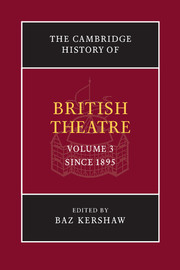Book contents
- Frontmatter
- Part I 1895–1946
- 1 British theatre, 1895–1946: art, entertainment, audiences – an introduction
- 2 The London stage, 1895–1918
- 3 Provincial stages, 1900–1934: touring and early repertory theatre
- 4 Popular theatre, 1895–1940
- 5 Case study: Cicely Hamilton’s Diana of Dobson’s, 1908
- 6 A critical year in perspective: 1926
- 7 The London stage, 1918–1945
- 8 Social commitment and aesthetic experiment, 1895–1946
- Part II Scottish and Welsh Theatres, 1895–2002
- Part III 1940–2002
- Bibliography
- Index
- References
5 - Case study: Cicely Hamilton’s Diana of Dobson’s, 1908
from Part I - 1895–1946
Published online by Cambridge University Press: 28 March 2008
- Frontmatter
- Part I 1895–1946
- 1 British theatre, 1895–1946: art, entertainment, audiences – an introduction
- 2 The London stage, 1895–1918
- 3 Provincial stages, 1900–1934: touring and early repertory theatre
- 4 Popular theatre, 1895–1940
- 5 Case study: Cicely Hamilton’s Diana of Dobson’s, 1908
- 6 A critical year in perspective: 1926
- 7 The London stage, 1918–1945
- 8 Social commitment and aesthetic experiment, 1895–1946
- Part II Scottish and Welsh Theatres, 1895–2002
- Part III 1940–2002
- Bibliography
- Index
- References
Summary
Diana of Dobson’s, by Cicely Hamilton, was one of the undoubted hits of British theatre in 1908, proving both a popular and a critical success. Mischievously subtitled ‘A Romantic Comedy in Four Acts’, the play made its audiences laugh at the same time as it made them think about theatrical convention, voyeurism, the ‘living-in’ system for shop employees, sweated labour and capitalism, homelessness and unemployment, double standards and the nature of marriage. The number of issues with which it engages may seem formidable but, as one reviewer wrote, Hamilton
has driven her lesson home with almost brutal frankness … [yet] has not fallen into the error of making everything subservient to the lesson she seeks to inculcate as so often obtains in ‘plays with a purpose’ … [S]he has so adroitly ‘gilded the pill’ that the work in itself is simply delightful and of absorbing interest.
Almost unanimously, critics hailed it as fresh and original, blending realism and romance, and doing so with considerable wit.
Before exploring the play, its issues and contemporary reception, it is worth examining the circumstances of its production. After three weeks in rehearsal, Diana opened at the Kingsway Theatre, London, on Wednesday 12 February 1908, the second offering of Lena Ashwell’s management there. Ashwell, who was a leading actor, had taken over the small theatre on a long lease, renamed and redecorated it. Her announced policy was
‘to alternate Plays of serious interest with Comedies, and to produce at Matinées pieces which, while worthy of production by reason of their artistic merit, would not perhaps interest a sufficient number of the public to warrant their being placed in a regular evening Bill. Thus … I hope to form a Repertory of Plays likely to appeal to the varied tastes of my Patrons.’
- Type
- Chapter
- Information
- The Cambridge History of British Theatre , pp. 110 - 126Publisher: Cambridge University PressPrint publication year: 2004
References
- 1
- Cited by

